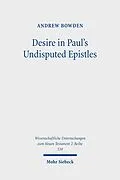In this study, Andrew Bowden analyzes Paul's use of 'desire' (????????, ??????????, and ????????) in his undisputed epistles. After introducing critical research on these lexemes, the author applies John Lyons's theory of semantic analysis to the use of ???????? ??? in Roman imperial texts. Based on these observations, he makes a hypothesis concerning the common co-occurrences of 'desire' in Roman imperial texts, its antonyms, the objects it longs for, and its use within metaphorical discourse. This hypothesis is then tested by looking at the use of 'desire' in Dio Chrysostom, Epictetus, Lucian of Samosata, the Cynic epistles, and Second Temple Jewish texts. Andrew Bowden illustrates how, contrary to the view of many scholars, these Roman imperial authors consistently mention positive objects of 'desire.' He then applies these findings concerning 'desire' to Paul, yielding important and sometimes unexpected discoveries.
Born 1984; 2006 BA; 2010 MDiv; 2011 MTh; since 2018 Research and Teaching Fellow (Wissenschaftlicher Mitarbeiter) at the Faculty of Protestant Theology, New Testament, of the Ludwig-Maximilians-Universität Munich, Germany; 2020 PhD.
Autorentext
Zusammenfassung
In this study, Andrew Bowden analyzes Paul's use of 'desire' (????????, ??????????, and ????????) in his undisputed epistles. After introducing critical research on these lexemes, the author applies John Lyons's theory of semantic analysis to the use of ???????? ??? in Roman imperial texts. Based on these observations, he makes a hypothesis concerning the common co-occurrences of 'desire' in Roman imperial texts, its antonyms, the objects it longs for, and its use within metaphorical discourse. This hypothesis is then tested by looking at the use of 'desire' in Dio Chrysostom, Epictetus, Lucian of Samosata, the Cynic epistles, and Second Temple Jewish texts. Andrew Bowden illustrates how, contrary to the view of many scholars, these Roman imperial authors consistently mention positive objects of 'desire.' He then applies these findings concerning 'desire' to Paul, yielding important and sometimes unexpected discoveries.
Born 1984; 2006 BA; 2010 MDiv; 2011 MTh; since 2018 Research and Teaching Fellow (Wissenschaftlicher Mitarbeiter) at the Faculty of Protestant Theology, New Testament, of the Ludwig-Maximilians-Universität Munich, Germany; 2020 PhD.
Autorentext
Born 1984; 2006 BA; 2010 MDiv; 2011 MTh; since 2018 Research and Teaching Fellow (Wissenschaftlicher Mitarbeiter) at the Faculty of Protestant Theology, New Testament, of the Ludwig-Maximilians-Universität Munich, Germany; 2020 PhD.
Zusammenfassung
In this study, Andrew Bowden analyzes Paul's use of 'desire' (????????, ??????????, and ????????) in his undisputed epistles. After introducing critical research on these lexemes, the author applies John Lyons's theory of semantic analysis to the use of ???????? ??? in Roman imperial texts. Based on these observations, he makes a hypothesis concerning the common co-occurrences of 'desire' in Roman imperial texts, its antonyms, the objects it longs for, and its use within metaphorical discourse. This hypothesis is then tested by looking at the use of 'desire' in Dio Chrysostom, Epictetus, Lucian of Samosata, the Cynic epistles, and Second Temple Jewish texts. Andrew Bowden illustrates how, contrary to the view of many scholars, these Roman imperial authors consistently mention positive objects of 'desire.' He then applies these findings concerning 'desire' to Paul, yielding important and sometimes unexpected discoveries.
Titel
Desire in Paul's Undisputed Epistles
Untertitel
Semantic Observations on the Use of epithyme?, ho epithym?t?s, and epithymía in Roman Imperial Texts
Autor
EAN
9783161596315
Format
E-Book (pdf)
Hersteller
Digitaler Kopierschutz
Adobe-DRM
Dateigrösse
5.71 MB
Anzahl Seiten
619
Unerwartete Verzögerung
Ups, ein Fehler ist aufgetreten. Bitte versuchen Sie es später noch einmal.
